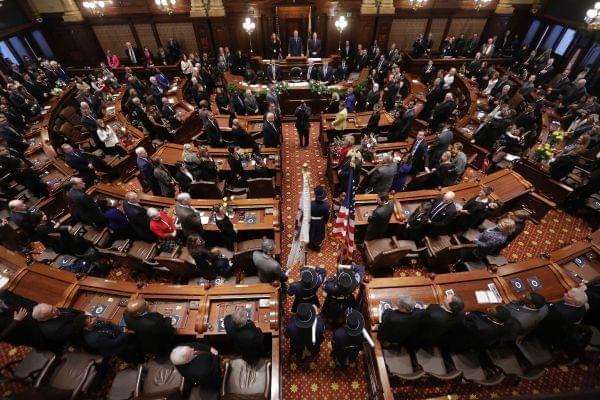After Rauner Veto, Lawmakers Consider Next Steps On School Funding

This Jan. 14, 2015 file photo shows the the Senate chamber at the State Capitol, in Springfield Ill. t was a big year in the Illinois statehouse with lawmakers ending an historic budget impasse and approving an income tax hike, overhauling how public schools get funding and allowing automatic voter registration. Now, a fresh set of 215 laws takes effect Jan. 1, 2018. The laws cover numerous topics, including the expansion of taxpayer-funded abortions, celebrating Barack Obama's presidency, allowing tax credits for private school scholarships, criminal justice reforms and a circus-related ban. Seth Perlman/AP File Photo
Schools and lawmakers are considering next steps now that more than 170 school districts in Illinois stand to lose additional money that was promised to them under the state’s new school funding formula. The landmark law passed last year with the intent to even the economic playing field for public schools across the state by providing more state dollars to the neediest districts.
Earlier this week, Gov. Bruce Rauner issued an amendatory veto of a key piece of legislation designed to allow the Illinois State Board of Education to implement the law as legislators intended. Without that trailer bill – dubbed SB 444 – the agency says it won’t be able to distribute about $350 million in new funding equitably or on time, according to ISBE spokesperson Jackie Matthews.
Matthews says the agency was in the process of finalizing the models used to distribute money to districts based on the language included in the now-vetoed bill. She says lawmakers made a mistake when they drafted the historic school funding formula last year. The trailer bill, SB 444, was designed to correct language that would have credited school districts for resources they can’t actually access, Matthews says. Rauner issued an amendatory veto of that bill on Monday.
Without the bill, any new funding “would be distributed unfairly and not in accordance with the equitable intent of the law,” Matthews says. Payments to schools would also be delayed, she says.
In his veto letter, Rauner stated that he would sign a revised version of the bill if lawmakers agree to add language to make it easier for private schools to participate in a controversial tax credit program that favors private schools.
The last-minute veto resulted in confusion and uncertainty for both school officials and lawmakers. “Do we need to do some kind of override? I just really don’t know what we’re going to do at this point until we get back to session,” says State Rep. Carol Ammons, a Democrat from Urbana.
State Sen. Daniel Biss, a Democrat running for governor, says the veto created a “crisis.” Biss campaigned in Champaign on Friday.
“I think the best step would be to override the veto and we’ll see if there are enough Republicans willing to stand up to this governor and his reckless decision to do just that, and if not we’ll have to come back to the drawing board quickly to enact a different solution,” Biss said.
Legislators have three options to deal with the amendatory veto: They can vote to override the governor, in which case the trailer bill will become law in its original form; they can vote to approve the governor’s requested changes to the bill; or they can do nothing and the bill will die.
Lawmakers are scheduled to return to Springfield on Jan. 23.
Links
- Private Schools In Limbo As General Assembly And Governor Haggle Over School Funding Language
- Bill Links Private School Tax Break To Public School Funding
- Governor Signs School Funding Reform Bill
- Reactions To Governor Rauner’s Education Veto; Chicago Companies At CES; Banned Books In Prisons
- Private Schools Attract $36 Million Via Tax Credit Program

